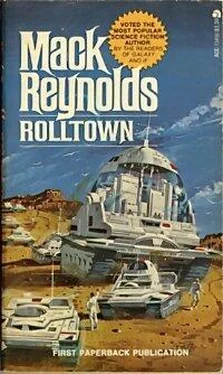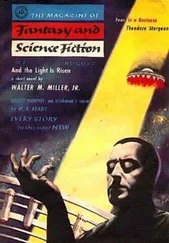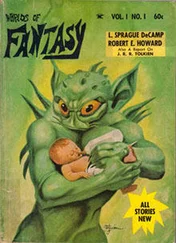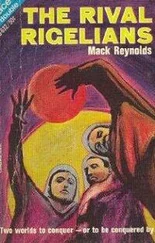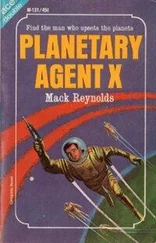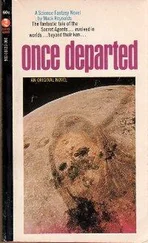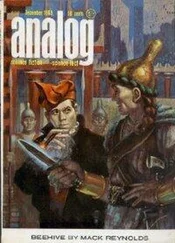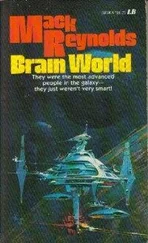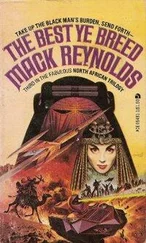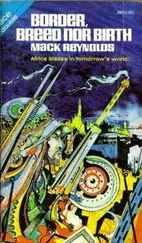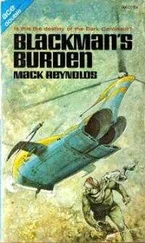Mack Reynolds - Rolltown
Здесь есть возможность читать онлайн «Mack Reynolds - Rolltown» весь текст электронной книги совершенно бесплатно (целиком полную версию без сокращений). В некоторых случаях можно слушать аудио, скачать через торрент в формате fb2 и присутствует краткое содержание. Год выпуска: 1976, Издательство: Ace Books, Жанр: Фантастика и фэнтези, на английском языке. Описание произведения, (предисловие) а так же отзывы посетителей доступны на портале библиотеки ЛибКат.
- Название:Rolltown
- Автор:
- Издательство:Ace Books
- Жанр:
- Год:1976
- ISBN:нет данных
- Рейтинг книги:4 / 5. Голосов: 1
-
Избранное:Добавить в избранное
- Отзывы:
-
Ваша оценка:
- 80
- 1
- 2
- 3
- 4
- 5
Rolltown: краткое содержание, описание и аннотация
Предлагаем к чтению аннотацию, описание, краткое содержание или предисловие (зависит от того, что написал сам автор книги «Rolltown»). Если вы не нашли необходимую информацию о книге — напишите в комментариях, мы постараемся отыскать её.
magazine in Jul and Sep 1969 issues under the title “The Towns Must Roll”.
Rolltown — читать онлайн бесплатно полную книгу (весь текст) целиком
Ниже представлен текст книги, разбитый по страницам. Система сохранения места последней прочитанной страницы, позволяет с удобством читать онлайн бесплатно книгу «Rolltown», без необходимости каждый раз заново искать на чём Вы остановились. Поставьте закладку, и сможете в любой момент перейти на страницу, на которой закончили чтение.
Интервал:
Закладка:
He stood and said, an indignation in his tone, “When we decided to make this trek, all the way to South America, did any of us labor under the illusion that it was all going to be peaches and cream? Didn’t we realize that we proposed to go through some of the wildest country remaining in North, Central and South America? Didn’t we realize that there was going to be all sorts of hardship and accident before we got through? Didn’t we all accept that some of our vehicles would break down, that some of us, before we were through, would possibly die from one cause or the other? Didn’t we all know that there would be bad weather, landslides earthquakes, and possibly bandits? Very well. This is our first stop. Is it going to be our last south of the border? Are we going to chicken out at the first threat#longdash#not actuality, thus far, just a threat#longdash#of danger?”
He sat down abruptly.
Armanruder said, “Thank you Mr. Zogbaum. Anyone else?”
Phil Terwilliger requested permission to speak.
He said, “It is all very well for a young man such as Mr. Zogbaum to be so gung ho, to wish to press on into adventure. However, when my wife, who is already quite ill, and I voted to take this trip with the rest of the town, we did not expect to be bitten by snakes in Nicaragua, or buried by a landslide in Costa Rica, nor…” his elderly voice went sarcastic “… attacked by headhunting Indians in Ecuador. We had been of the opinion that with the advent of the Pan American Highway it was quite possible these days to travel all the way to our destination in reasonable comfort and safety. However, if on our first day we are threatened by a body of armed men, one of whom told Mr. Hardin that he wouldn’t particularly mind shooting him, then I think we have stuck our necks into something more than we had originally planned. I strongly urge that we turn back as a town. But if you others vote to go on then I, at least, will disassociate myself from New Woodstock and return to the States to take up residence in some other mobile town or city.”
There were others. They spoke in varying degrees of heat, indignation or fearfulness, some taking one side, some the other.
When it was finally put to the vote, four-fifths of the assembly were for going on. The remainder refused to accept the decision of the majority and decided to return in a body to Texas. The returnees numbered approximately one hundred of the mobile homes, largely those owned by the more elderly.
The question then became what to do with the community property such as the auxiliary vehicles and the town treasury, which was not overly large. The treasury was accumulated by a slight tax on all citizens of the town, or a community assessment if an emergency of more than usual magnitude developed.
Since the vote had gone so strongly for the element that wished to go on, it was decided that all auxiliaries remain with New Woodstock and that those that were returning be recompensed out of town funds for their share of what they left behind.
And the question then became, where were these funds to come from, since the treasury held no such amount?
This was solved by several of the more affluent town members such as Armanruder, Doctor Barnes and Jim Blake making a loan to the town which would be repaid as rapidly as tax money came in. A small levy was also to be made, small enough as not to be a strain even on citizens who existed solely on their NIT, to help in the transaction.
Still another problem arose. Among those who were to return was the middle-aged Barbara Stevens, the competent nurse of Doctor Barnes. He had two or three other practical nurses in the town, or whom he could call in emergency, but Miss Stevens was the only professional.
It was decided immediately to issue a call through the United Mobile Cities Association and its TV newspaper for a nurse, preferably a volunteer, but, if necessary, one who could be put on the town payroll.
Someone suggested that very possibly they could pick up a nurse in Mexico City who would work for considerably less pay than an American, if no American on NIT volunteered to take the position without recompense.
Someone else suggested that the Mexican nurse, if one was found, be offered free living quarters in the hospital. This would lessen the amount of pay necessary and New Woodstock was too small a town to support much in the way of a town payroll. It was also pointed out that a Mexican nurse would be a double advantage. She would be able to communicate in Spanish all the way down to South America, in Spanish medical terms. Doctor Barnes did not have Spanish, and there were very few in the whole town who did.
XII
In all, the meeting of the assembly took several hours and Bat Hardin could see that they wouldn’t be getting away that day. He didn’t like it. He didn’t like giving the vigilantes under Don Caesar the extra time to consolidate their forces and to prepare for whatever trouble they had in mind against New Woodstock.
But there was nothing for it. Even after the assembly had adjourned, there was considerable to be done in the breakaway of the hundred mobile homes that had decided to return to the States. And when all business had been handled, there was still the personal relationships that had in some instances been abuilding for years. Artists, of whatever sort, have a tendency toward emotionalism, and many a tear was shed, many a kiss exchanged. In fact, many a drink was knocked back after an appropriate toast. Bat had a sneaking suspicion that the hundred defectors wouldn’t return in a body to McAllen, Texas, but would straggle back.
In the old days, folk who lived in what were then trailers, moved about as individuals. It wasn’t until after the Second World War that the first beginnings of the mobile towns and cities began to manifest themselves. They started, possibly, as the trailer clubs, groups of compatible persons who would get together during vacations and take a tour, in company, to here, there, or the other place, usually to some National Park or other attraction. At that same time, the large trailer sites were developing where people lived in supposedly mobile homes but who, in actuality, never moved or, at least, seldom did. Indeed, many of the so-called mobile homes of that day were incapable of being moved, their wheels long since gone, or, at least, their tires flat and their axles rusting away.
The permanent mobile home parks still remained, developed considerably, with enlarged facilities and with governmental systems. And these were largely populated with the more elderly and sedentary types. They were to be found in all parts of the country, in fact in all parts of North America, but largely in the climatic and scenically desirable areas. They were strung out along the West Coast from Washington to Baja California, strung out along both Floridian coasts and far up into Georgia and the Carolinas and along the Gulf coast to Brownsville, Texas, and beyond. The high altitudes of Arizona and New Mexico were dotted everywhere with them and up into Colorado and Utah and, in the United States proper, as far north as Glacier National Park.
But it was the mobile town which actually kept on the move that was really the innovation of the new post-industrial state. Where in the past the trailer clubs had taken to the road for a few weeks at a time during the vacation periods, now, with the coming of NIT, large elements of the population were on what amounted to permanent vacation. And those with itchy feet kept on all but constant move. Oh, they might stop and pause, here or there, whenever the attraction was such that a prolonged stay seemed desirable, but largely they kept on the move. And while they had begun with, at most, a few dozen campers, trailers and mobile homes, the numbers increased and eventually what had been trailer clubs became mobile villages, then towns, then cities.
Читать дальшеИнтервал:
Закладка:
Похожие книги на «Rolltown»
Представляем Вашему вниманию похожие книги на «Rolltown» списком для выбора. Мы отобрали схожую по названию и смыслу литературу в надежде предоставить читателям больше вариантов отыскать новые, интересные, ещё непрочитанные произведения.
Обсуждение, отзывы о книге «Rolltown» и просто собственные мнения читателей. Оставьте ваши комментарии, напишите, что Вы думаете о произведении, его смысле или главных героях. Укажите что конкретно понравилось, а что нет, и почему Вы так считаете.
